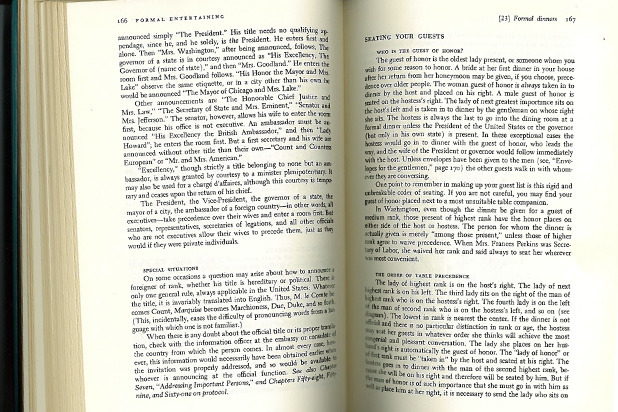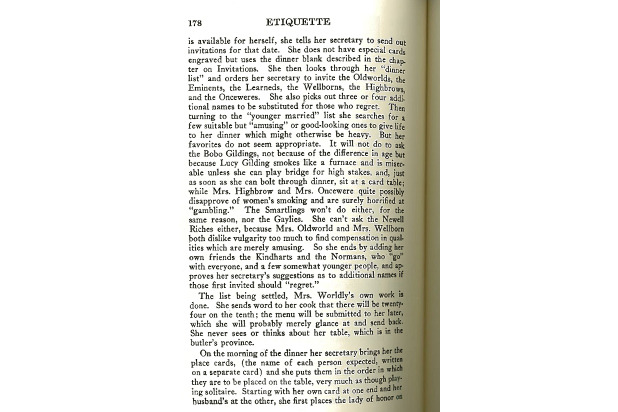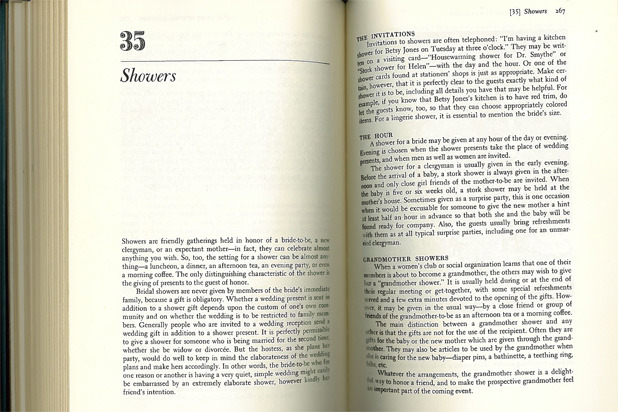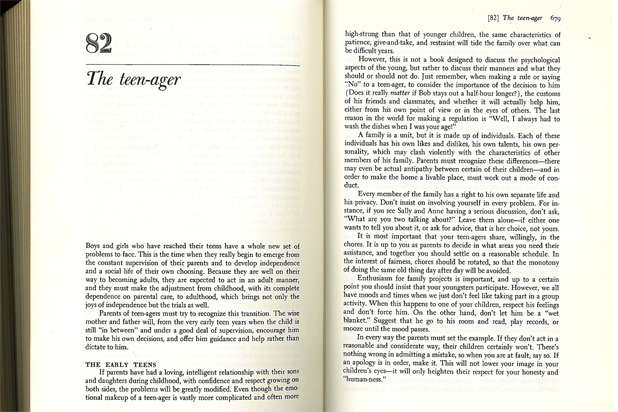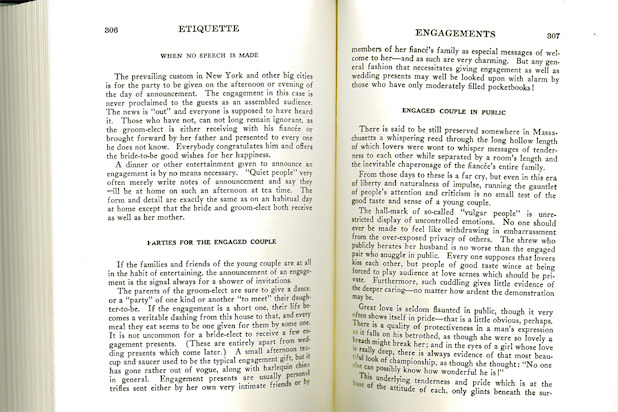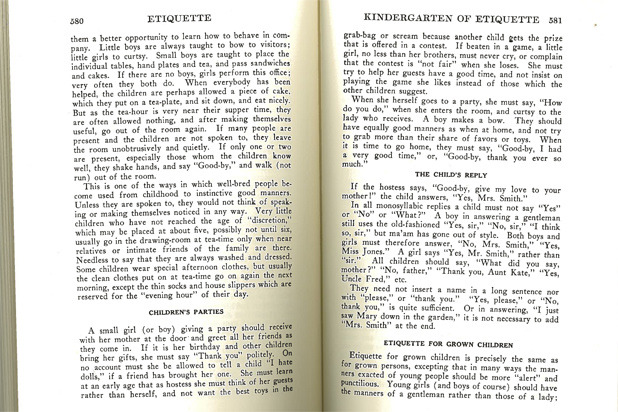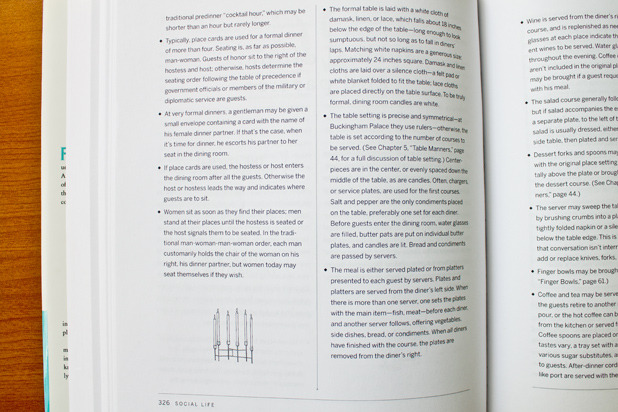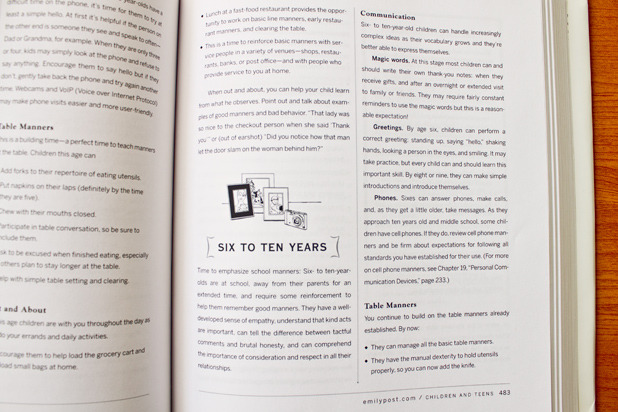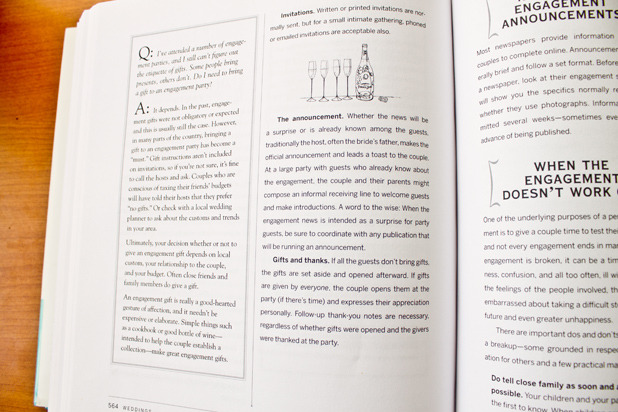How The Queen Of Etiquette Has Changed Slideshow
Gone is the time when the host chose where people sat — instead, it was all about social standing. "The woman guest of honor is always taken in to dinner by the host and placed on his right. A male guest of honor is seated on the hostess's right. The lady of next greatest importance sits on the host's left and is taken in to dinner by the gentleman on whose right she sits." Page 167.
Seating Arrangements, 1922
In the '20s, arranging seats was likened to a game of solitaire. On the morning of the dinner, a host's secretary would bring her the finished cards and they would put them in order, "starting with her own card at one end and her husband's at the other." The guests of honor would then be seated next to them, but the remaining guests were seated according to character, with "those congenial to each other" sitting together. Pages 178-179.
Wedding Gifts, 1969
"Whether a wedding present is sent in addition to a shower gift depends on the custom of one's own community and on whether the wedding is to be restricted to family members." In other words, they both a shower and a wedding gift weren't required anymore.
"Generally people who are invited to a wedding reception send a wedding gift in addition to a shower present. Although sometimes shower presents are given in place of wedding presents, more generally they are an extra expression of generosity and of much less importance than the wedding gifts." Pages 266-267.
Children at the Table, 1969
By the late '60s, children were no longer expected to stand or move when an adult was to sit at the table. Yet, they were still held to the same expectation of good behavior, not because it was dictated necessarily, but as a rite of passage. Children "begin to emerge from the constant supervision of their parents and to develop independence and a social life of their own choosing." An ill-mannered child seems to reflect less on the parents and more on the child themselves. Page 679.
Wedding Gifts, 1922
Tradition holds that brides-to-be would commonly receive both engagement and wedding gifts, usually small, personal "trifles" from friends and family. "A small afternoon teacup and saucer used to be the typical engagement gift, but it has gone rather out of vogue, along with harlequin china in general." Pages 306-307.
Children at the Table, 1922
In the 1920s, it was a considered a privledge for children to dine with adults. Only after they passed through the "Kindergarten of Etiquette" were they deemed ready for the grown-up dinner table.
They were held to the same standards as adults, "excepting that in many ways the manners exacted of young people should be more 'alert' and punctilious." Young girls (and boys) "should have the manners of a gentleman rather than those of a lady." They were to stand, give up the best seat, and be the last to walk into a room. Pages 581-585.
Seating Arrangements, 2011
These days, when hosting a dinner party, seating is casual. Should place cards be used, they're typically "used for a formal dinner of more than four." And whenever possible, seating is "man-woman." Page 326.
Children at the Table, 2011
Up to age 10, children should be expected to manage all the basic table manners, "have manual dexterity to hold utensils properly, set the table, chewing with their mouths closed and not talk with their mouth full."
The standards of good behavior rise when it comes to pre-teens. By then, "children should know how to tackle tricky mealtime situations." They should know what to do when they spill, or find something unespected in their soup or in their mouth. "At this point children should be expected to have the same table manners as adults." Pages 483-487.
Wedding Gifts, 2011
In the past, gifts celebrating an engagement were not obligatory or expected. These days, if there is a celebration held, gifts are often viewed as "a must." Yet many modern brides choose to forgo gifts. "It's perfectly acceptable for the couple to suggest a 'gift-free' gathering when someone offers to host a party for them." And should gifts be given, particularly at a shower, they should fit the theme of the party, and not be too costly or elaborate. And if you're not sure? "It's fine to call the host and ask." Pages 564; 627-628.
